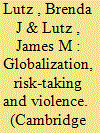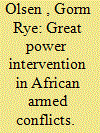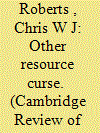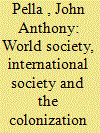|
|
|
Sort Order |
|
|
|
Items / Page
|
|
|
|
|
|
|
| Srl | Item |
| 1 |
ID:
139002


|
|
|
|
|
| Summary/Abstract |
Past research has found that globalization and political violence have been linked in both modern and less modern times. Normally, groups that have been disadvantaged or displaced by globalization are seen as responsible for these outbreaks of violence. In the case of the Late Republic of Rome and medieval Italy before the Renaissance, violence was actually prompted by major increases in wealth among those who benefited when control of the political system became much more valuable. The increased value raised the stakes of political control and underlay the resulting higher levels of violence.
|
|
|
|
|
|
|
|
|
|
|
|
|
|
|
|
| 2 |
ID:
139005


|
|
|
|
|
| Summary/Abstract |
This paper asks why the United States (US), China and the European Union (EU) have intervened in a number of armed conflicts in Africa in the twenty-first century. Scrutiny and comparison of the motivations and interests of the three non-African actors in intervening in African crises are assumed to contribute to understanding the changing geopolitical environment and the current conditions for conflict management in Africa. The focus is not on trade and aid. The paper launches the hypothesis that the explanations why the US, China and the EU have intervened are basically identical. In spite of different evaluations of the specific crisis situations, the interventions have been about taking care of the ‘national interest’ of each of the three non-African actors. National interest is defined as either ‘hard core’ (security) or ‘core’ concerns (security and economic wealth).
|
|
|
|
|
|
|
|
|
|
|
|
|
|
|
|
| 3 |
ID:
139007


|
|
|
|
|
| Summary/Abstract |
A burgeoning interest among academics, policy-makers and civil society groups has developed concerning Africa's extractive sector and particularly its mining codes, which are now at the centre of a wider policy debate over natural resource governance and economic development on the continent. This article reviews the evolution of Africa's regulatory codes in the mining sector, which has undergone what Bonnie Campbell describes as ‘three generations’ of liberalization since the 1980s. We also highlight new voluntary, regional and transnational initiatives, driven by a host of heterogeneous actors from Africa and abroad, which constitute a ‘fourth’ generation of mining codes and natural resource governance practices that place primary emphasis on transparency and accountability by both mining companies and host governments. This new generation of natural resource governance initiatives presents new opportunities as well as unique challenges, particularly with the growing role of emerging economies such as the BRICS (Brazil, Russia, India, China and South Africa). We conclude by assessing future trends and policy challenges in Africa's extractive sector governance.
|
|
|
|
|
|
|
|
|
|
|
|
|
|
|
|
| 4 |
ID:
139008


|
|
|
|
|
| Summary/Abstract |
Since 2010, many African governments have challenged twenty years of extractive sector liberalization that has played a key role in unlocking mineral riches and attracting foreign direct investment. The potential for extractives to drive economic structural transformation is intuitively attractive, the Africa Mining Vision (2009) document providing a primary template. Geological inheritance alone, however, is not a panacea for economic development, industrialization or poverty alleviation. While much attention to the ‘resource curse’ has identified the problem of excessive rent-seeking and the consequent impact on elite consolidation, democracy, governance and macroeconomic distortions, a more fundamental problem, the ‘other resource curse’, may be an overlooked driver: a lingering assumption that mineral resources should straightforwardly provide significant revenue streams for public goods, inputs for industrial transformation, and extensive employment. Geology alone is neither conducive nor antithetical to economic development. Stakeholders require a more comprehensive understanding of the possibilities and limits of extractives in contemporary Africa.
|
|
|
|
|
|
|
|
|
|
|
|
|
|
|
|
| 5 |
ID:
139003


|
|
|
|
|
| Summary/Abstract |
The recent global financial crisis has generated substantial research interest in the relationships among savings, inequality and global imbalances. Our study examines the causes of global imbalances by analysing the relationship between income inequality and economic performance and the relationship between savings imbalances and economic instability. We identify a positive link between savings and inequality whenever savings are allocated through the financial market to investment firms for production. However, this relationship becomes negative when non-saving households borrow savers' funds for consumption. Our findings suggest that income inequality should be reduced in both China and the US to mitigate global imbalances.
|
|
|
|
|
|
|
|
|
|
|
|
|
|
|
|
| 6 |
ID:
139006


|
|
|
|
|
| Summary/Abstract |
The revival of China's interest in Africa is often highlighted as being an opportunity to provide African governments with a choice between development partners that may strengthen negotiation leverage and thereby carve out policy space to define and implement policies that affect social and economic development. This article critically reviews the most recent developments in Chinese and Organisation for Economic Cooperation and Development (OECD) approaches to development finance to Africa. It argues that although we can detect a number of incidents that point towards more policy space for African governments, the revival of China's development finance does not fundamentally alter the power relations between African countries and their financiers, as the tendency now is towards convergence and cooperation between China and Development Assistance Committee (DAC) donors—not divergence and competition, which could have created policy space as it did prior to the end of the Cold War. This follows the trend of other ‘emerging’ donors who increasingly play by DAC rules and thereby minimize the future possibility of playing out one partner against the other.
|
|
|
|
|
|
|
|
|
|
|
|
|
|
|
|
| 7 |
ID:
139004


|
|
|
|
|
| Summary/Abstract |
This article utilizes an English School approach to examine the European colonization of Africa between 1871 and 1908. Drawing upon Clark's framework for understanding the relationship between world society, international society and international institutions, it argues that the colonization of Africa was very much dependent upon the activity of non-state actors who essentially pushed European states into the formal colonization of the African interior. Such a case sheds important light on the destructive role world society has played in international politics, a topic which has received no attention in the English School literature. Moreover the study provides additional empirical insights into the relationship between world society, international society and international institutions, while also bringing much needed empirical discussion of colonization into the English School catalogue.
|
|
|
|
|
|
|
|
|
|
|
|
|
|
|
|
|
|
|
|
|